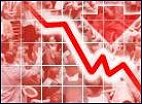
The U.S. economy has been battered by a bigger-than-expected slump in housing but will keep growing next year as consumers get relief from soaring energy costs.
The NABE panel predicted that the overall economy, as measured by the gross domestic product, would expand by 2.5% in 2007.
That is down slightly from the previous survey in September which forecast that the U.S. economy would grow by 2.7% next year. The expectations for 2006 were also marked down with GDP growth now put at 3.3% instead of 3.4% forecast in the previous survey.
A bigger-than-anticipated slump in housing was the primary reason for the reductions.
The Federal Reserve engineered the current economic slowdown with a 2-year campaign to push interest rates up. The Fed's goal was to achieve a soft landing in which economic growth slowed enough to reduce inflation without bringing on a recession.
The slower growth will have an impact on the job market, unemployment rate could rise from an expected average for all this year of 4.7% to 4.9% in 2007.
The forecasters, however, said the fall in inflation pressures will mean that the Fed will not feel the need to raise interest rates further. They predicted that the federal funds rate, the interest that banks charge each other, will remain at the current 5.25% for an extended period. After raising rates at 17 consecutive meetings, the Fed has kept rates unchanged since August.
The NABE panel said the central bank's next move would likely be to cut rates, once inflation pressures retreat further. The forecasters saw 2 quarter-point rate cuts occurring in the second half of next year.
 You don't need a crystal ball to see a ramp-up in government support for ethanol coming down the pike. Just look at who's in charge of next year's doozy of a farm bill.
You don't need a crystal ball to see a ramp-up in government support for ethanol coming down the pike. Just look at who's in charge of next year's doozy of a farm bill. 






